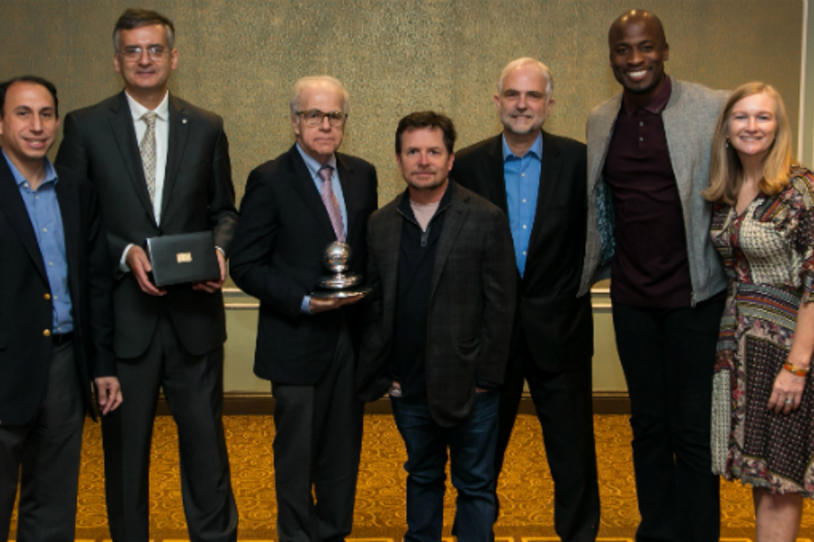
The Michael J. Fox Foundation for Parkinson's Research (MJFF) honored two researchers for their groundbreaking work to speed critical advances in Parkinson's disease (PD) and dystonia research on November 11, 2017 in New York City.

Andres Lozano, MD, PhD, professor of neurosurgery at the University of Toronto and Toronto Western Hospital, and a founding member of MJFF's Scientific Advisory Board, was awarded the third annual Bachmann-Strauss Prize for Excellence in Dystonia Research. The prize recognizes dystonia researchers for key scientific discoveries and incentivizes the next generation of investigators to continue forging paths toward cures. Lozano was selected in recognition of his pioneering work in deep brain stimulation (DBS), including its use to treat dystonia, a movement disorder characterized by painful, prolonged muscle contractions that result in abnormal movements and postures.
Sometimes compared to pacemakers in cardiovascular disease, DBS is a surgical procedure in which thin wires called electrodes are placed into one or both sides of the brain in specific areas and deliver electrical pulses to brain cells to decrease symptoms. DBS is used to treat an array of brain disorders in addition to dystonia, including Parkinson's disease.
Lozano will receive an unrestricted research grant of $100,000, which he plans to direct toward the advancement and use of DBS treatment for dystonia.
Ken Marek, MD, president and senior scientist at the Institute for Neurodegenerative Disorders in New Haven, Connecticut, received the Robert A. Pritzker Prize for Leadership in Parkinson's Research. Marek also is a founding member of MJFF's Scientific Advisory Board, and serves as principal investigator of the Foundation's landmark biomarker study, the Parkinson's Progression Markers Initiative (PPMI).
The Pritzker Prize has been awarded annually since 2011 by MJFF to recognize researchers who make an exceptional contribution to Parkinson's research and exhibit a commitment to mentoring the next generation of Parkinson's scientists. Marek's work strives to identify Parkinson's in its earliest stages, particularly with imaging technologies, and his efforts have validated dopamine activity loss seen in specialized brain scans as an early marker of the disease.
In addition to his work on PPMI, a longitudinal MJFF-sponsored study of more than 1,500 participants at 33 clinical sites around the world, Marek leads the Parkinson's Associated Risk Syndrome (PARS) study under way at 15 clinical sites in the United States.
Marek will receive a $100,000 grant, which he will use to build on PPMI and PARS findings to create a Parkinson's risk prediction model looking at factors such as brain dopamine activity, smell loss and genetics.
The Bachmann-Strauss Prize for Excellence in Dystonia Research was established in September 2014 with a leadership commitment from the Bachmann-Strauss Dystonia and Parkinson Foundation (BSDPF). The alliance between MJFF and BSDPF builds on a 10-year working relationship between the foundations. This major dystonia research prize broadens public awareness and recognizes key scientific discoveries in dystonia.
The Robert A. Pritzker Prize for Leadership in Parkinson's Research was established by Karen Pritzker, daughter of Robert A. Pritzker, and her late husband, investor Michael Vlock. The prize is named in honor of the late Robert A. Pritzker, a renowned industrialist, entrepreneur and philanthropist. The award is designed by renowned artist and Parkinson's patient Tom Shannon.